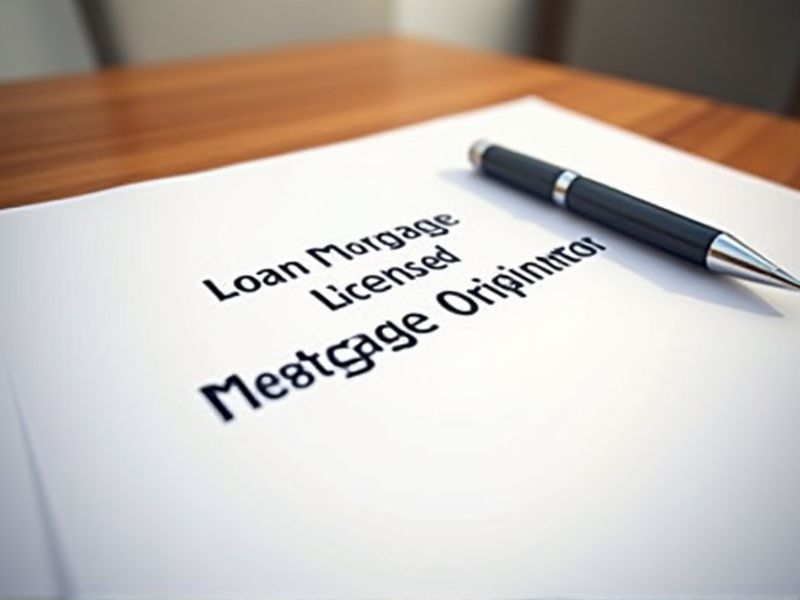
The mortgage industry is heavily regulated to ensure consumer protection and financial stability, which necessitates that Mortgage Loan Originators (MLOs) possess certain certifications. Obtaining these certifications demonstrates an MLO's competence in mortgage laws, ethical lending practices, and understanding of financial transactions. These qualifications also help to build trust with consumers, lenders, and regulators. Important certifications you may need for a Mortgage Loan Originator include the National Mortgage Licensing System (NMLS) licensure, state-specific licenses, and ongoing continuing education credits.
NMLS Mortgage Loan Originator License
A Mortgage Loan Originator needs the NMLS license to legally provide mortgage loans, ensuring compliance with state and federal regulations. The license acts as a verification of the individual's education and proficiency in lending procedures and ethical standards. Without this license, an originator cannot legally operate, which can lead to penalties or business closure. Borrowers can be confident knowing that NMLS licensed professionals are held to industry standards, promoting transparency and trust in financial transactions.
SAFE Mortgage Loan Originator Test Certification
The SAFE Mortgage Loan Originator Test Certification ensures a mortgage loan originator has the necessary knowledge of federal and state laws and regulations. This requirement aims to protect consumers by promoting ethical practices and reducing fraudulent activities within the mortgage industry. Passing the test helps maintain a standardized level of competency among loan originators, fostering consumer confidence. Regulatory agencies can monitor industry compliance more efficiently when originators are certified.
State-Specific MLO License
The requirement for a state-specific MLO license ensures that each Mortgage Loan Originator is thoroughly acquainted with the distinct real estate laws and regulations prevalent in their particular state, facilitating informed and compliant lending practices. Varying state criteria necessitate specialized knowledge, prompting each state to mandate its own licensing to safeguard its residents from malpractice and to maintain market stability. By enforcing state-specific licenses, states can monitor and regulate the activities of MLOs within their jurisdiction, ensuring accountability and quality service. This licensing necessity also helps in maintaining a standardized benchmark for evaluating MLOs' proficiency and ethical standards, ultimately fostering trust with consumers.
Certified Mortgage Banker (CMB)
Certified Mortgage Banker (CMB) designation enhances a Mortgage Loan Originator's credibility, demonstrating a deeper knowledge of the industry. Extensive training and education that accompany the CMB designation often lead to better decision-making and risk assessment. Clients are more likely to trust a CMB-certified professional, which could result in increased business opportunities. Having a CMB may also provide a competitive edge in the job market, translating into potential career advancement.
Certified Residential Mortgage Specialist (CRMS)
The Certified Residential Mortgage Specialist (CRMS) designation enhances a Mortgage Loan Originator's expertise in complex loan scenarios, leading to more tailored client solutions. CRMS training deepens the professional's knowledge of industry regulations, ensuring compliance and risk management. Achieving CRMS status demonstrates dedication to ongoing professional development, which can build trust with clients. This credential often sets loan originators apart, potentially increasing their competitiveness in a crowded market.
Accredited Mortgage Professional (AMP)
Achieving AMP certification equips a mortgage loan originator with advanced industry knowledge, which enhances their ability to serve clients effectively. The recognition associated with AMP status often instills greater trust from both clients and employers, reflecting a commitment to ethical standards and continuous education. Mortgage loan originators with AMP certification tend to have a competitive edge in the job market, as it signals a deeper understanding of complex mortgage processes. The broader skill set acquired through this accreditation can lead to improved customer satisfaction and potentially higher closing rates.
Certified Mortgage Consultant (CMC)
A Certified Mortgage Consultant (CMC) brings advanced expertise, which enhances an originator's ability to navigate complex mortgage regulations. This specialized knowledge increases the likelihood of securing favorable loan terms for clients, potentially improving client satisfaction and retention. The presence of a CMC can mitigate risks related to compliance issues, safeguarding the mortgage loan originator's professional standing. Employing a CMC may lead to higher efficiency in the loan process, potentially resulting in increased business volume for the originator.
National Association of Mortgage Brokers (NAMB) Certification
NAMB Certification for Mortgage Loan Originators enhances credibility and trust among clients by validating the professional's expertise in the mortgage industry. The certification process helps ensure compliance with regulatory standards, reducing the risk of legal issues for both the originator and the lending institution. It often leads to improved business opportunities as clients and employers are more likely to prefer certified professionals. Completing NAMB Certification also signifies a commitment to ongoing professional development, keeping loan originators updated with the latest industry trends and practices.
Certified Anti-Money Laundering Specialist (CAMS)
CAMS training equips mortgage loan originators with the skills to identify and mitigate potential money laundering activities, safeguarding financial institutions. This training ensures compliance with regulatory requirements, minimizing the risk of costly fines or legal repercussions. When mortgage loan originators are well-versed in anti-money laundering practices, it enhances customer trust and maintains the integrity of financial transactions. The presence of CAMS-certified professionals in the mortgage process can deter fraudulent activities by introducing stringent scrutiny measures.
Financial Services Certified Professional (FSCP)
Obtaining the Financial Services Certified Professional (FSCP) designation enhances a mortgage loan originator's credibility, as it signifies a commitment to professional ethics and continuous learning. This certification equips professionals with advanced knowledge in financial planning, which improves their ability to advise clients on appropriate mortgage options. FSCP training focuses on customer relationship management, boosting a loan originator's skills in building trust and retaining clients. Based on industry trends, certified professionals often experience better career prospects and increased job satisfaction.
Summary
When you, as a Mortgage Loan Originator, obtain additional certifications, expect enhanced credibility, leading to increased trust from clients. Your advanced knowledge likely allows for more efficient loan processing, which could improve customer satisfaction. Certifications can expand your expertise, making you more adaptable to complex market changes. Overall, you might see career advancement opportunities due to your specialized skills.
